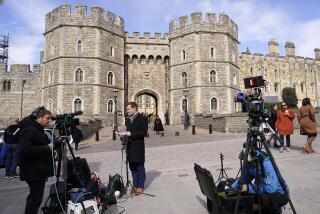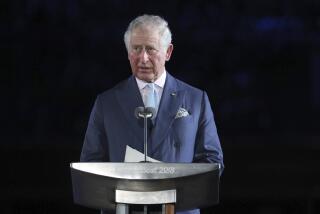Newly Named Nepal King Dies of Wounds
- Share via
KATMANDU, Nepal — With the second declaration of a Nepali king’s death in just four days, public anger and confusion intensified today and stone-throwing demonstrators took to the streets demanding to know the truth behind the slayings of Nepal’s royal family.
In an emergency meeting, the state council confirmed that King Dipendra had officially been declared dead early this morning. The council proclaimed Dipendra’s uncle, Prince Gyanendra, who had been acting king, the new monarch.
Officials privately blame Dipendra--crown prince before he was named king after his father’s death--for shooting his parents and six other members of the family Friday night before turning the gun on himself.
In a statement read over official Radio Nepal, Gyanendra said Dipendra’s death “paves the way to investigate what happened last Friday.”
Gyanendra had said Sunday that the royals were killed, and at least three more members of the family wounded, by the “accidental firing of an automatic weapon.”
But the first reports of the deaths, which quoted unidentified military and government sources, said Dipendra, 29, had massacred his family at the dinner table in a dispute over his choice of a bride.
Keshar Jung Rayamjhi, who heads the state council, said Sunday that he had visited the young king Saturday in a military hospital and found him unconscious. A bullet had entered Dipendra’s head through one temple and gone out the other after boring through his brain, Rayamjhi said in an interview.
“How it happened, I cannot imagine,” he said. “I cannot even guess.”
Rishikesh Shaha, a trusted advisor at the court of King Mahendra, who died in 1972, has toasted and dined with Nepal’s royals, hunted tigers with them and even spent time in their jails, so he knows the mind of the monarchy well.
“There is a streak of madness in that family,” Shaha said Sunday.
Shaha became one of Mahendra’s most vocal critics as the founder of the Human Rights Organization of Nepal and a leader of a pro-democracy campaign that landed him in jail several times from 1951 to 1989.
Shaha said he visited Mahendra’s son, King Birendra, 13 days before the palace massacre. He said he tried to persuade the Harvard-educated ruler that, to save the country, it was time for him to retake the authority that was stripped from him after a parliamentary democracy was established in 1990.
“I said, ‘You should take over as soon as possible,’ but he delayed, and that was his biggest mistake. Look at things now. I hate to see all this,” Shaha, 80, said, and a heavy cough erupted from deep inside his chest.
“This king was so simple, poor man,” Shaha added, before pausing to cough again. “I feel for him in my heart. I told him: ‘Look, there is no discipline. Your country has become a country without a king.’ ”
In Britain on Sunday, newspapers carried articles about the three years the crown prince spent at Eton, the country’s toniest private school. (His younger brother, who was among the dead, was a classmate of Britain’s Prince William there.)
“It caused a stir when it emerged that the new boy had a loaded revolver in his room. But then he had concubines in the palace back home,” fellow student Oliver Poole wrote in the Sunday Telegraph.
The diminutive but stocky Nepalese known as “Dippy” knew how to use the gun and kept it on instructions of the Nepalese Embassy in case anyone tried to kidnap him, recalled Poole, who said the prince also kept illegal bottles of liquor in his room.
Poole also wrote about meeting the crown prince once shortly after his 18th birthday, when he had been elevated to deity status in Nepal. At Eton, that meant that he was excused from chapel, which the other students were obliged to attend.
“Yes, I am a god now,” Poole quoted him as saying. “But the main thing is always what you feel inside, not what people say about you. It is up to all of us to prove that we are special.”
Meanwhile, in Nepal, speculation about the young woman for love of whom the prince may have committed murder has focused on Devyani Rana, the daughter of Pashupati Rana, an Oxford-educated member of parliament and former government minister.
Because the queen was a member of the powerful Rana family herself, one theory holds that she rejected Devyani because her family was from a rival Rana clan.
But rumors about the events Friday night are so rife that many Nepalese say they don’t know what to believe.
“People like me don’t know what happened inside the palace,” said Lok Bahador Shrestha, 49, as he had his head shaved by a roadside barber to honor the late king.
“Maybe after a few days, things will become clearer,” said Shrestha, a street vendor. “But now, my life will become more difficult because of this. Our father figure has died, and all people like me are deeply concerned about our safety and security.”
Most of Nepal’s 22 million people are so devoted to their king, a living god to the Hindu majority, that even longtime Communists like Rayamjhi are die-hard monarchists.
“The people feel secure if they have the monarchy,” said Rayamjhi, who once made the same point to a slightly startled Chairman Mao Tse-tung, the leader of China’s often brutal revolution against a centuries-old ruling class.
A spreading insurgency by Maoist guerrillas is now one of the biggest threats to Nepal, and the monarchy is a bastion against it, Rayamjhi insisted.
“It is the permanent symbol and guardian of national unity. If there is a separatist movement and national unity is broken, we cannot maintain our sovereignty and independence,” he said.
Even though Shaha went to jail several times for demanding democracy, he saw Birendra as Nepal’s last hope against the rot of corruption--which, he charged, had spread to the royal palace itself.
Shaha called the king’s wife and one of his brothers “racketeers” and claimed that Queen Aishwarya was involved in trafficking hashish, among other black market ventures.
The queen was “a highly vindictive woman” who “wanted to victimize me,” said Shaha, a regent’s professor of political science at UC Berkeley in the mid-1970s and author of Nepal’s first constitution.
Shaha is also a former Nepalese ambassador to the U.S. and the United Nations.
In one photo on his living room shelf, he is shown smiling at former Secretary of State John Foster Dulles from a New York hospital bed.
That was in 1957, when a mugger stabbed Shaha in Central Park because he didn’t have any cigarettes.
The New York press was eager to know what he thought about the incident, Shaha wrote in his 1997 autobiography, “Looking Back at My Own Career.”
“I replied that ‘hoodlums are hoodlums everywhere in the world, and this could have happened to me in any big city in the world, including Katmandu,’ ” he wrote.
*
Times staff writer Marjorie Miller in London contributed to this report.
More to Read
Sign up for Essential California
The most important California stories and recommendations in your inbox every morning.
You may occasionally receive promotional content from the Los Angeles Times.













